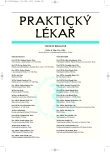Photoallergic skin reactions due to systemic application of drugs
Authors:
L. Malina
Authors‘ workplace:
Mediscan Group, dermatologie, Praha
Published in:
Prakt. Lék. 2008; 88(4): 213-214
Category:
Various Specialization
Overview
Photoallergic skin reactions are less common than phototoxic eruptions. However, they can appear due to the systemic application of several drugs. These eruptions are due to delayed cell mediated reactions, on the basis of hapten formation by Langerhans cells, T-cells and later on by various cytokines and chemokines. They usually develop as a consequence of the exposition to solar radiation under the influence of different types of systemic treatment by the same mechanism which occurs in non-photosensitive allergic contact dermatitis. Action spectrum of these reactions lies mostly within the range of UVA and UVB ultraviolet radiation (280−400 nm), partly also of visible light. The drugs that cause photoallergic skin reactions include for the most part nonsteroidal antiinflammatory drugs, fluorochinolons, phenothiazines, thiazides, and sulphonamides. Skin reactions can be diagnosed by their clinical characteristics, histopathology and particularly by photoepicutaneous tests with their modifications, sometimes also by exposition tests. Treatment of photoallergic skin reactions is usually symptomatic and often only local, with the use of antiinflammatory ointments or corticosteroids. Nevertheless, in some cases systemic administration of antihistamines or steroids is inevitable. Protective clothing and high-SPF sunscreens are necessary for long-term photoprotection.
Key words:
photodermatoses, UV-radiation, photoallergy, phototesting, phototherapy, photoprotection.
Sources
1. Epstein, J.H. Phototoxicity and photoallergy. Semin. Cutan. Med. Surg. 1999, 18, p. 274−284.
2. Allen, J.E. Drug-induced photosensitivity. Clin. Pharm. 1993, 12, p. 580−587.
3. Tokura, Y. Immune response to photohaptens: implications for the mechanisms of photosensitivity to exogenous agents. J. Dermatol. Sci. 2000, 23, Suppl. 1: S6−S9.
4. Stein, K.R., Scheinfeld, N.S. Drug-induced photoallergic and phototoxic reactions. Expert. Opin. Drug. Saf. 2000, 6, p. 431−443.
5. Moore, D.E. Drug-induced cutaneous photosensitivity: incidence, mechanism, prevention and management. Drug. Saf. 2000, 25, p. 345−372.
6. Hölzle, E., Neumann, N., Goerz, G. Photoallergie − Mechanismus und Diagnostik. In: Licht und Haut, E. Macher et al., Eds., Biermann (Zülpich) 1993, s. 135−142.
7. Braun-Falco, O., Plewig, G., Wolff, H.H., Burgdorf, W.H.C. Photoallergic Dermatitis. In: Dermatology, 2nd Ed., Springer (Berlin) 2000, p. 557−559.
8. Epstein, J.H. Photomedicine, Photoallergy. In: The Science of Photobiology, Smith, K.C., Ed., Plenum Press (New York) 1977, p. 197−198.
9. Schauder, S. Photodiagnostik: Der modifizierte intradermale Test im Vergleich zu anderen Verfahren zum Nachweis von phototoxischen und photoallergischen Arzneireaktionen. Z. Hautkr. 1990, 65, s. 247−251.
10. Malina, L. Fotoalergické reakce. In: Fotodermatózy, 2. vyd., Maxdorf (Praha), 2005, s. 104−107.
11. Neumann, N.J., Lehmann, P. Photodiagnostic Modalities. In: Dermatological Phototherapy and Photodiagnostic Methods. Krutmann, J., Hönigsmann, H., Elmets, C.A., Bergstresser, P.R., Eds., Springer (Berlin) 2001, p. 329−337.
12. Hölzle, E. The Photopatch test. Ibidem, p. 338−343.
13. Malina, L. Fotodiagnostika. Čs. derm. Suppl. 2001,76, s. S4−S9.
14. Bryden, A.M., Moseley, H., Ibbotson, S.H. et al. Photopatch testing of 1155 patients: results of U.K. multicentre photopatch study group. Br. J. Dermatol. 2006, 155, p. 737−747.
15. Lincová, D., Farghali, H. a kol. Základní a aplikovaná farmakologie. Galén (Praha) 2002, p. 277−280.
16. Příborský, J. Chinolony. Maxdorf (Praha) 2000, p. 52−54.
17. Lankerani, L., Baron, E.D. Photosensitivity to exogenous agents. J. Cutan. Med. Surg. 2004, 8, s. 424−431.
18. Zembowicz, A. Photosensitive reactions to drugs and chemical agents. Pathol. Intern. 2004, 54 (Suppl. 1), p. S560−S562.
19. Magnus, I.A. Polymorphic light eruption and summer prurigo. In: Dermatological Photobiology, Blackwell (Oxford) 1976, p. 174−188.
Labels
General practitioner for children and adolescents General practitioner for adultsArticle was published in
General Practitioner

2008 Issue 4
- Advances in the Treatment of Myasthenia Gravis on the Horizon
- Hope Awakens with Early Diagnosis of Parkinson's Disease Based on Skin Odor
- Memantine in Dementia Therapy – Current Findings and Possible Future Applications
- Memantine Eases Daily Life for Patients and Caregivers
- Possibilities of Using Metamizole in the Treatment of Acute Primary Headaches
-
All articles in this issue
- Prevention and early detection of the vascular complications of diabetes
- Topical treatment of rheumatic diseases by non steroidal anti-inflammatory drugs
- The history of the development of our understanding of food and the importance of nutrients in human nutrition
- Auditory system and its disturbances
- Sarcoidosis- a systemic disease. What is new?
- Photoallergic skin reactions due to systemic application of drugs
- Seasonal work in agriculture – risk of organophosphates
- Ankle-brachial indices and risk of cardiovascular complications
- Triplane fracture of distal tibia in children
- Prenatal diagnostics and its success in the Czech Republic
- Self-mutilation and male external genitalia injury
- Fatal abscessing pneumonia caused by oxacillin-resistant Staphylococcus aureus producing Panton-Valentine leukocidin
- Extraintestinal symptoms of coeliac disease
- General Practitioner
- Journal archive
- Current issue
- About the journal
Most read in this issue
- Extraintestinal symptoms of coeliac disease
- Sarcoidosis- a systemic disease. What is new?
- Triplane fracture of distal tibia in children
- Fatal abscessing pneumonia caused by oxacillin-resistant Staphylococcus aureus producing Panton-Valentine leukocidin
